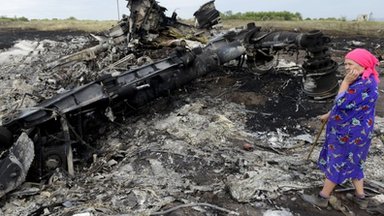
The BBC’s Daniel Sandford reports from Grabove: “A quiet village at the heart of an international tragedy” Western countries have demanded that Russia put pressure on Ukrainian rebels to allow unhindered access to the site of Thursday’s Malaysia Airlines crash. Dutch PM Mark Rutte said he had told Russian President Vladimir Putin that time was “running out” to show he could help. Most crash victims were Dutch. The US and Britain also told Russia full access to the area was needed. Memorial services are being held in Australia, with more planned in other countries later on Sunday. Bishop Peter Comensoli, who led the mass at Sydney’s St Mary’s Catholic Cathedral, said the downing of MH17 was not “an innocent accident” but “the outcome of a trail of human evil”. The Australian Prime Minister Tony Abbott, who was at the service, told ABC TV: “You look at the faces of the dead and they’re your neighbours, they’re your friends, they could be your kids because let’s face it, we are a people who like to travel.” In Melbourne, a special mass was held for the HIV experts and campaigners on the flight who were making their way to the city for an international Aids conference. The passenger list released by Malaysia Airlines shows the plane was carrying 193 Dutch nationals (including one with dual US nationality), 43 Malaysians (including 15 crew), 27 Australians, 12 Indonesians and 10 Britons (including one with dual South African nationality), four Germans, four Belgians, three from the Philippines, and one each from Canada and New Zealand. Both Ukraine and the pro-Russian rebels have accused each other of shooting down the Boeing 777, which was flying from Amsterdam to Kuala Lumpur. Flight MH17 was reportedly hit by a missile over a rebel-held area in Donetsk region on Thursday. All 298 people on board died. ‘Deeply concerned’ International observers have had their movements around the crash site restricted by pro-Russia militiamen. The US said it was “deeply concerned” at the limited access to the site. “It is critical that there be a full, credible, and unimpeded international investigation as quickly as possible,” said a statement from the State Department in Washington. Ukraine has accused militiamen at the site of the Malaysia Airlines crash of trying to destroy evidence of an “international crime”. In a news conference on Saturday, Mr Rutte said he had had an “intense” phone call with Mr Putin. “I told him ‘Time is running out for you to show the world that you have good intentions’,” Mr Rutte said. He added that Dutch people were “furious” at pictures of bodies being carried across the open country, and called on the Russian president “to show that he will do what is expected of him and will exert his influence”. The BBC’s Richard Galpin at the site says he saw bodies being removed by emergency workers, but it was not clear where they were being taken, or whether the workers were loyal to the rebels or the Kiev government. At the main site the bodies were without covering. Some lay alone. Others were grouped together amid the twisted metal, the bags and cases, the child’s playing cards, the guide books, the laptop computer, the duty free whiskey bottle, the woman’s hat. A militiaman with the nickname “Grumpy” – he was squat and barrel-chested with poor teeth and carried a machine gun – harangued me when I asked if the rebels would now stop fighting. “You are only here because foreigners are dead,” he said. And the old story was repeated, the same I have heard on numerous roadblocks – the Western media were all capitalists doing the bidding of their American and EU masters. When the OSCE turned up in a convoy “Grumpy” came into his own. Now he was a man of power. He halted the OSCE and told them they would have to go forward on foot. Standoff with militia at crash site German Chancellor Angela Merkel also spoke to Mr Putin on Saturday, urging his co-operation. Monitors from the Organization for Security and Co-operation in Europe (OSCE) are at the crash site. OSCE spokesman Michael Bociurkiw said access had improved compared to Friday and that the monitors were seeing parts of the terrain they had not seen before, but that their movements were still being restricted. The monitors are there to observe the site ahead of the arrival of international investigators. ‘Act of terrorism’ Tougher EU sanctions against Russia will be needed if Moscow does not change its “approach” to the downing of the plane, UK Prime Minister David Cameron has indicated. He said the EU should stand up for its principles, amid claims Russia-backed rebels were involved. Prime Minister David Cameron and his Australian counterpart Tony Abbott agreed the two countries would apply “further pressure” at the UN Security Council “for swift and unhindered access” to the site, Mr Cameron’s office said. British Foreign Secretary Philip Hammond said: “The world’s eyes will be on Russia to see if she delivers on her obligations.” US Secretary of State John Kerry discussed the disaster in a phone conversation with Russian Foreign Minister Sergei Lavrov. Mr Kerry made clear that the US was “very concerned” over reports that bodies and debris from the site had been removed or tampered with, the state department said. On Friday US President Barack Obama said the plane had been destroyed by a missile fired from a rebel area, and that insurgents would not be capable of carrying out such an attack without Moscow’s support. Russia denies any involvement and has rejected Western allegations that it is stoking the Ukraine conflict. Ukraine’s government has called Thursday’s disaster an “act of terrorism” and released what it says are intercepted phone conversations that proved the plane was shot down by separatists.

